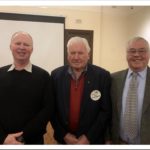Guest speakers were from the Rotary Club of Albury North, with the topic being “The Drought”. Roger Paterson, Bill MacDonald and Andrew Hore all made passionate speeches which were personal and factual accounts of the effects that drought is having on their lives. Despite the fact that we have had good rain over the past few weeks, we are a long way from things being ok. Roger told us that his farm has been in the family for 97 years and that this is the worst drought ever. A telling sign of the drought is the fact that their main dam is 12 metres deep when full. At the moment, it is down to 1/2 metre deep.
He spoke of hidden
costs associated with the drought, which include cartage and pumping of water.
For example, the strain on Rotary Club of Albury Hume
District 9790 pumps is immense, so the family needs to have multiple pumps to
prepare for the almost certain scenario that one will fail at an inopportune
time. Overall, the drought has cost over $180,000 in lost income in the past
year. Adding to this is the fact that costs have risen in excess of $300,000
over the same period of time. Roger told us that planning for drought is an
important part of running a farm. However, this drought is off the charts and
no amount of planning could take into consideration the severity of this
particular event.
Bill went on to tell
us that his family originally took possession of the property in 1863. There is
a spring on their farm that feeds Sweetwater Creek, which is currently dry. The
only other time that this has happened was in 1916. He also told us that there
is an old farm saying that if the rabbits
are breeding, then there’s a good year ahead. The rabbits aren’t breeding
this year, which is a strong indicator that things aren’t looking good for the
upcoming season. Andrew made the point that mental fatigue is an everyday
reality of dealing with drought. Just like humans need more than one feed a
day, animals need proper feeding routines. This means that Andrew and his
family need to be out and about feeding stock seven days a week. There are no days off to rest and recuperate.
This can lead on to mental health issues as farmers struggle with the realities
of the worst drought on record.
Let’s do all we can to look after our farmers, because without them, we
wouldn’t hav



